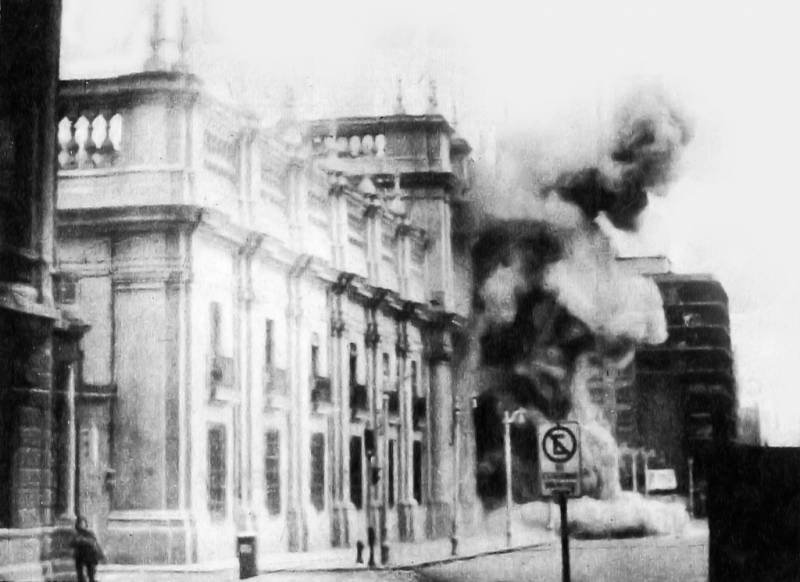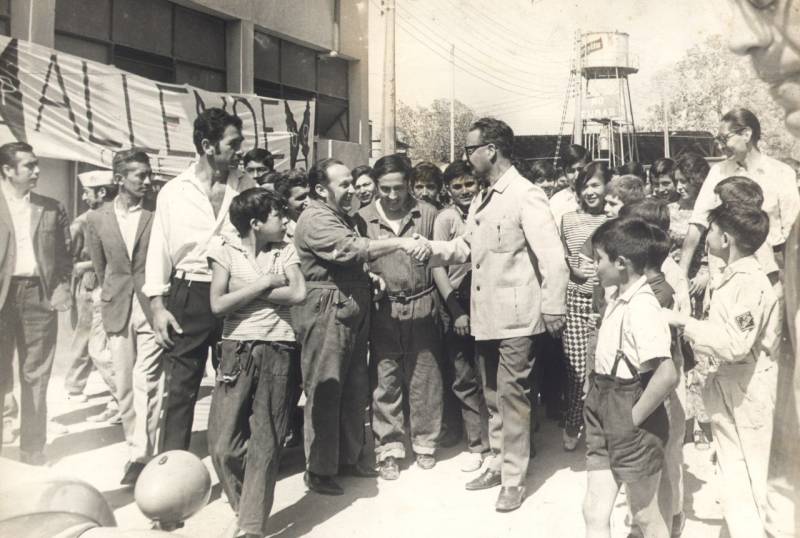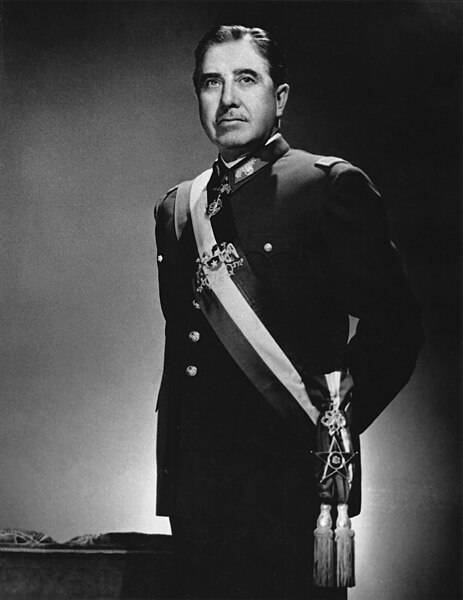Ultracapitalism of Pinochetism and its lessons for Russia

The bombing of the presidential palace "La Moneda" during the military coup in Chile
On September 11, 1973, as a result of a military coup in Chile, a military junta led by General Pinochet came to power. An ultra-liberal fascist regime was established in Chile for many years - terror along with liberal anti-popular monetarist “reforms”.
People's power
Chile at that time was the most European, civilized country in Latin America, with a relatively high level of prosperity. In 1969, the leftist, social democratic political parties of Chile formed the Popular Unity bloc, whose candidate Salvador Allende won the 1970 presidential election. Chileans are tired of living in a country that was a former capitalist periphery. The country was a classic mono-economy, living solely on the export of copper and saltpeter. The principle of the authorities was quite familiar to current citizens of the Russian Federation: we sell resources, buy everything we need abroad.
Therefore, the people chose the left, who wanted to build a new socialism without blood and violence. They focused on the program of social democratic development, import substitution, relying on their own strengths. The new government nationalizes leading enterprises, carries out agrarian reforms in the interests of peasants, and takes measures to improve the lives of workers and employees. Relations with the countries of the socialist camp are being improved.
Allende's victory came as a surprise to both the USSR and the USA. The country in southwestern South America was part of Washington's sphere of influence. Therefore, Chile immediately came under severe pressure from economic sanctions. The country was in a fever due to Western sanctions, rising world oil prices, strikes and sabotage by right-wing forces within the country.
In 1971, the famous scientist, professor at 30 universities, Englishman Stafford Beer, the founder of organizational cybernetics, one of the creators of the theory of intelligent human structures, arrived in Chile. The Chilean government invited him to create a unified computerized system for managing the economy in real time. The system was called “Cybersyn” (Cybernetic synergism). It was supposed to work using the Cybernet network. In those days there was no Internet or fiber optic communication lines. The Cybernet communication network was supposed to include radio stations and telephone lines, which were connected to a single central computer. Beer, in essence, offered the Chileans a breakthrough into the future. In one leap, overtake even the developed world!
A system of network connections was built. A working virtual model of the country was created in which various options and solutions could be tested. The cumbersome and ineffective bureaucratic system was replaced by a network structure. The country received huge savings in effort, money and time.
In 1972, Beer published the brochure “Five Principles for the People.” In fact, it was direct democracy, power of the people based on high technologies that belonged to all people. Beer advocated a merciless fight against the bureaucratic golem. For direct contact between the people and the authorities and the immediate response of the authorities to the requests of the people. For direct personal responsibility of officials and government representatives (which was the strong point of the Stalinist USSR).
Beer noted:
And further:

Salvador Allende, 1972
Crisis
The country was sitting on the needle of import supplies. As soon as copper prices went down, the mines were nationalized by the new authorities, and an economic blockade began. There was no currency to buy cars, spare parts, or a lot of goods. In October 1972, the country was swept by the so-called. "national strike", initiated by the Confederation of Truck Owners, who feared nationalization. With the help of the Cybernet network, it was possible to organize the supply of food to cities and manage transport as efficiently as possible.
To overcome the crisis and begin to rise, it was necessary to tighten our belts. Rebuild, set up new production. However, Allende's opponents did not want to wait, they did not want a new world. He was opposed by offended bureaucrats, whose parasitism was excluded by Beer’s system, by the comprador bourgeoisie trading in their homeland, by small businesses and trade unions who did not want to tighten their belts and work in a new way. And the Americans poured gasoline on it all and set it on fire. The national independence of Chile and its autonomous project for the future were very disliked by the US owners and the TNK-TNB connection
Allende, an honest and strong-willed man with developed systems thinking, supported Beer. However, the advanced project was interrupted by the coup of 1973. The old world (representatives of big capital, landowners, officials and the military caste, oriented to the West) destroyed the embryo of the future. The country remained on the periphery of the capitalist world.
Ultracapitalism of Pinochetism
On September 11, 1973, in the capital of Chile, Santiago, a military coup was carried out by the army, which was led by right-wing elements. President Salvador Allende and the Popular Unity Government were overthrown, and a military junta led by General Pinochet came to power. All political parties that were part of the bloc were banned, and their members were subjected to severe repression. Allende himself died during the storming of the presidential palace.
In Chile, a liberal fascist regime was established for many years - terror, along with ultra-liberal anti-people monetarist "reforms".
Together with Augusto Pinochet came the so-called. “Chicago economists” (Friedman’s students) with monetary methods, total privatization and an unlimited “market”. Therefore, the Russian “perestroika-reformers-optimizers” of the 1990-2000s literally extolled the dictatorship of Pinochet and his “economic miracle” on the bones of the people. Plus terrible corruption and shootings in stadiums. Obscurantist ideology: “God, army and property”
In the very first days, the junta destroyed all possible resistance assets. More than 11 thousand people were seized, they were taken mainly to football stadiums, tortured and shot. General Stark's punitive forces operated in the north of the country. “Subversive elements” were destroyed. Chileans were terrorized.
Ultra-liberal monetarists carried out “shock therapy.” It is familiar to Russian citizens from the 1990s. Full privatization, deregulation, sharp reduction in social spending. State expenses were immediately cut by 10%, prices were freed, the market was opened to imports, and protectionist customs duties were abolished. Some forms of financial speculation were allowed, and privatization of the public sector of the economy began.

Chairman of the Government Junta of Chile (1973-1981), President and dictator of Chile in 1974-1990. Augusto Pinochet
Degradation of the country
"Successes" began immediately. Inflation was wild: under Allende, inflation did not rise above 163% per year, and in the first year of Pinochetism it, according to the most conservative estimates, amounted to 375%. Unemployment has jumped from a minimum of 2% to 20%! Part of the population did not even have money for food. A layer of new oligarchs-plutocrats, speculator financiers, and foreigners close to power immediately formed, who quickly enriched themselves from the suffering of the Chilean people. They were called "piranhas". And the ultra-liberal fascists demanded new “reforms”.
In 1975, Milton Friedman himself, the founder of the Chicago School, arrived in Chile. He convinced Pinochet to form a government entirely of monetarist economists. State spending was cut by 27% and continued to be cut. By 1980, government spending had been cut to half of what it had been under Allende. Hundreds of enterprises and banks were privatized. Due to the influx of imports and a drop in production, the number of jobs decreased by 1973 thousand from 1983 to 177. The country took out more and more loans, driving itself into debt bondage. Unemployment remained high.
Those dissatisfied with Pinochet's policies continued to be physically destroyed. The left-wing intelligentsia was killed, so already in 1976, 80% of political prisoners were from workers and peasants.
State schools were replaced by private, fee-paying ones. Kindergartens and cemeteries were privatized. Healthcare was made free of charge. Soon the average Chilean family only had enough money for food. The bus has become a luxury, getting up for work at 4 am to walk. People were forced to contribute part of their salaries to private pension funds. All this was done against the backdrop of state terror. After all, this "liberal" experiment was the first in the world.
In 1982, the unemployment rate rose to 30%. A huge external debt of $14 billion (for a country with a population of less than 10 million people), which was accumulated by local corporations. Hyperinflation, the country is on the verge of default. The authorities had to nationalize some companies! The monetarists were driven out of power. The Pinochet regime was saved only by the fact that it still controlled the mining and export of copper (85% of the treasury's foreign exchange earnings). Only in 1988 did economic growth begin, when the country already had 45% of the poor, the same as in the poorest countries in Africa. The terrible social stratification persisted even later.
Chile became a testing ground for ultra-liberal, radical “reforms”, which were then applied with similar “success” across the planet from South Africa to the post-Soviet republics.
As we see, the methods of ultra-liberals, both Chilean and Russian, are the same. Let me remind you that the commercialization of education and healthcare in the Russian Federation is in full swing. As well as the development of pension “reform”. As well as the powerful export of capital, the reduction of social spending, and the degradation of the national economy.
The results of Pinochet's rule were sad. Economic growth rates are quite comparable to other Latin American countries, but external debts are much higher. The mono-economy of the “pipe” has been preserved. Natural resources were rapaciously plundered. Non-state pension funds turned out to be ineffective. A sharp reduction in social spending - and the result is extreme poverty, corruption and crime. The top of the state is tied to parasitic income, robbery of the people, it helps the USA and TNCs to rob the country. Pinochet himself was an ordinary thief who took gold out of the country. The previously combat-ready army and security forces have decomposed into gangster formations that are dangerous only for the people.
Power of plutocrats, comprador bourgeoisie and ultra-liberal corporatocracy. In essence, fascism, but of a different type, not like that of Mussolini or Hitler, but in the interests of narrow rich and educated castes who hate the poor "losers".
Information